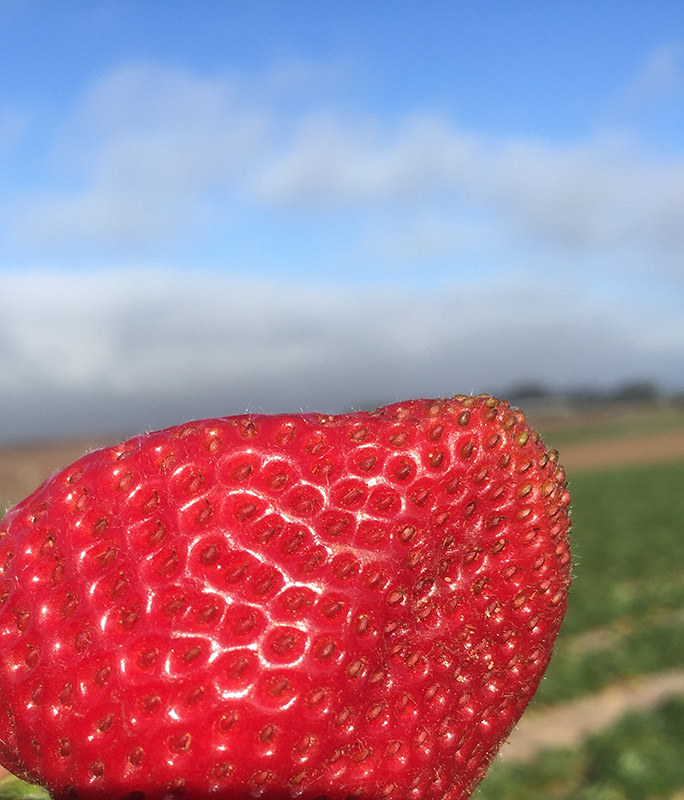Oct. 23, 2020
Want a fruitful strawberry crop? Scout now for pests
By Tracy Courage
U of A System Division of Agriculture
Fast facts:
- Drier conditions, warmer temperatures bring more mites
- Scout, sample and control now for mites
- Use miticides that kill all mite life stages
(338 words)
(Download this story in MS Word format here.)
LITTLE ROCK — A majority of the state’s strawberries are in the ground and growing, but some growers may have more mites to contend with than in years past.
“In some areas of the state, we’ve had very little rain recently, and those drier conditions are more conducive to mite populations,” Aaron Cato, Extension horticulture integrated pest management specialist with the University of Arkansas System Division of Agriculture, said. “Mites are active when temperatures are above 50 degrees, and during our winters in Arkansas, we have many days above 50 degrees. The combination of dry conditions and extended warm weather has led to more issues than we are used to seeing in the fall.”
Scouting, sampling and controlling mite populations now can ensure a more fruitful crop in the spring.
“If you have mites when you transplant, they’ll continue to reproduce fairly quickly in the fall,” Cato said. “If you are using row covers, that could mean more damage over the winter.”
Growers can get a good idea of their mite populations by sampling their fields and collecting 10 leaflets per acre.
“If you find five mites per leaflet, that indicates you need to spray the field,” he said.
Acamite, Kanemite, or Nealta are Cato’s recommended treatments because they kill not only the adult mites, but also the juveniles and eggs. Other treatments, such as Agri-Mek, may only kill the adult and juvenile mites, but not the eggs.
Cato and Amanda McWhirt, extension horticulture crops specialist, planted a strawberry variety trial on Sept. 30 and observed low populations on all varieties. This trial is located in Kibler, Arkansas, where there has been plenty of rainfall. San Andreas, Rocco and Liz varieties had the highest mite infestations. San Andreas and Albion are varieties that generally have mite issues.
“People who planted earlier in September may have even more problems,” Cato said. “That’s why it’s so important to get out now and scout.”
More information about fall management of strawberry pests is available on the Cooperative Extension Service website at https://www.uaex.uada.edu/farm-ranch/crops-commercial-horticulture/horticulture/ar-fruit-veg-nut-update-blog/posts/fallmgmtstrawberrypests.aspx.
To learn more about extension programs in Arkansas, contact your local Cooperative Extension Service agent or visit www.uaex.uada.edu. Follow us on Twitter at @AR_Extension.
About the Division of Agriculture
The University of Arkansas System Division of Agriculture’s mission is to strengthen agriculture, communities, and families by connecting trusted research to the adoption of best practices. Through the Agricultural Experiment Station and the Cooperative Extension Service, the Division of Agriculture conducts research and extension work within the nation’s historic land grant education system.
The Division of Agriculture is one of 20 entities within the University of Arkansas System. It has offices in all 75 counties in Arkansas and faculty on five system campuses.
Pursuant to 7 CFR § 15.3, the University of Arkansas System Division of Agriculture offers all its Extension and Research programs and services (including employment) without regard to race, color, sex, national origin, religion, age, disability, marital or veteran status, genetic information, sexual preference, pregnancy or any other legally protected status, and is an equal opportunity institution.
# # #
Media contact:
Tracy Courage
Director, Communications Services
U of A System Division of Agriculture
Cooperative Extension Service
(501) 671-2126
tcourage@uada.edu
